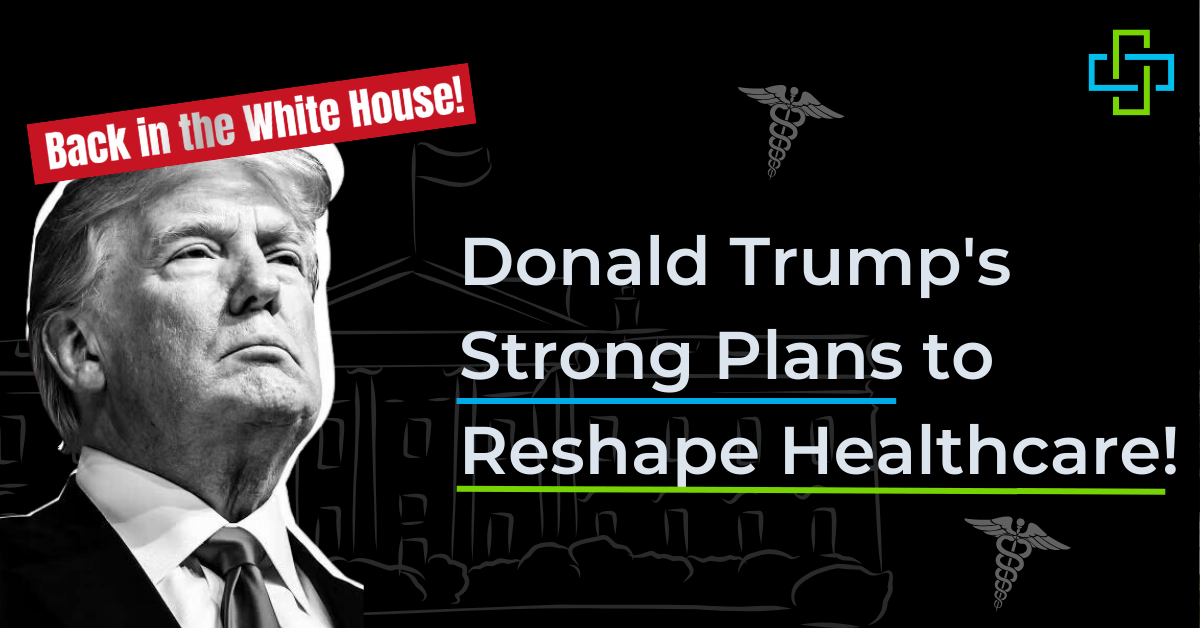Donald Trump Republican has won the presidency. This victory is signaling fundamental changes for federal health agencies and the industries that they regulate. He has pledged to reform the nation’s public health institutions, redesign federal health programs and reduce costs throughout the system.
It includes campaign associates like Robert F. Kennedy Jr, who is going to be able to swing for the fences on health freedom and medicine and food issues, something he mentioned as well in his relationship with Trump.
In his victory speech, Donald Trump repeated his promise to plans to reshape healthcare, saying:
“We can bring in people like Robert F. Kennedy Jr. He’s going to help make America healthy again… He’s dedicated, and we’re going to let him get to work.”
Trump made his pitch on economic growth and illegal immigration, while his Democratic rival Kamala Harris pitched health care to voters. Each promised to strengthen Medicare for seniors and lower health care costs.
The essential freedoms, listed by Harris as including reproductive rights, was against the backdrop of a changing stance by Trump during the campaign towards health care.
Trump’s Stance on Abortion and Gender-Affirming Care
Though Trump has stated he would not sign a nationwide abortion ban into law. He has pledged certain other measures that would define who access care and who can refuse to provide it. He is trying to ensure that federal funds are not used on gender affirmative care whilst stating perhaps most famously that will he be entirely ending access for minors.
Donald Trump has also vowed to preserve religious freedoms, which during his first presidency included exempting some employers from mandatory birth control coverage for religious reasons. While his stance on healthcare remains significant, he has indicated he does not want to rehash one of the signature battles of his first term: repealing the Affordable Care Act, which ultimately came up short. However, discussions on the plans to reshape healthcare policy continue to evolve, with MIPS healthcare solutions playing a crucial role in improving the quality and efficiency of care across the country.
Instead, Trump and congressional Republicans have free slashing costs inside the ACA perhaps allowing the existing enhanced taxation credits to expire. The GOP regained the Senate majority, making for a Republican Senate to aid in advancing Trump’s agenda and confirming his nominees. The Associated Press has so far refrained from declaring which party will control the House of Representatives.
A number of incomplete Biden administration aspirations lie in a state of limbo. There was a concerted effort on the part of President Biden along with Vice President Harris to assist Americans in owing less money for medical debts, expand the scope of behavioral healthcare access, and accelerate the time taken to negotiate for high-cost drugs with Medicare. However, come January when Trump will become President, another list of priorities will be in place.
Vaccines and Public Health
Trump claimed that he would establish a presidential commission to investigate the shocking rise in chronic illnesses, looking at factors such as food policy, the environment, federal health care agencies and possibly, the pharmaceutical industry itself.
While the candidate for the presidency has definitely embraced the call to “Make America Healthy Again” in trying to push for reforms of the system, he has always steered clear of the argument made by MAHA leaders such as RFK Jr. which argues that vaccines are somehow related to chronic disease.
Still, campaign surrogates have been selling in recent weeks the idea that the second administration is willing to explore conspiracy theories regarding the vaccine and vaccine-related risks.
Trump’s Health Plan: RFK Jr. and Vaccine Reduction
Before the elections, Trump transition co-chair Howard Lutnick appeared on CNN and explained that while RFK Jr would not be in charge of the Health and Human Services Department, he could be tasked with reducing the number of vaccines in use. Lutnik and others have placed liability for the pharmaceutical companies that manufacture the shots, on the table as well.
GOP lawmakers have already pointed fingers at two public health authorities, the Centers for Disease Control and Prevention, as well as the National Institutes of Health, and suggested radical changes. With CDC, this involves splitting the agency, with one part responding to and the other part aimed at infectious disease and chronic disease control respectively – the latter has increasingly been the focal point of Trump’s campaigns.
All these may involve possible reforms of providing substantial reviews of food policy and nutrition policy to both the CDC and the Food and Drug Administration, which have fortunately received support across party lines.
Trump’s Abortion Policy – Vetoing a Ban but Limiting Access in Other Ways
Trump has resisted some conservatives’ demand for nationwide abortion bans and in one of the presidential debates pledged to veto a national ban if it reached his desk.
However, abortion rights advocates say there are myriad other avenues that Trump could take to roll back abortion access and reproductive care more generally, through things like exemptions from providing insurance coverage for religiously affiliated employers. Trump’s FDA could also change guidance on whether the abortion pill mifepristone can be mailed to patients. Most abortions involve the use of Mifepristone.
Experts fear that the courts will move even more quickly to dismantle mail-order Mifepristone. AGs from 3 states joined the Mifepristone case after the Supreme Court remanded it back to a Texas district court. The arguments involve the legality of mailing abortion pills under decades-old obscure laws that haven’t been used in years. In the years to come, Trump’s Justice Department might be forced to defend the FDA in this case.
Plans to Reshape Healthcare & Health Insurance
GOP legislators and policymakers have floated a few options for dealing with ACA reform and both want to plow ahead with big changes. Multiple Republicans are against the expanded tax credits that maintain low ACA premiums, which are set to end next year.
JD Vance, the Vice President’s-elect even mentioned leaving it up to insurers to separate enrollees by risk pool and sell different policies to them based on those health risks. Though it may put cheaper insurance plans for healthier, younger Americans within reach it could simultaneously send older Americans and those suffering from chronic health problems into an abyss of increasing premiums, policy experts warn.
However, Trump never really talked about Medicaid on the campaign trail, and he didn’t include it in pledges not to cut spending for Medicare and Social Security programs.
Medicaid experienced a series of substantial policy changes during Trump’s first term, including an attempt to permit states to impose work requirements for certain recipients. The administration offered a framework for how states could impose these work requirements to coverage and approved 13 waivers to implement them. These changes have impacted the landscape of public health coverage, with implications for Medicare reimbursement policies as they continue to evolve alongside broader healthcare reforms.
In 2020, the program also offered states the option to turn a portion of their Medicaid funding into block grants.
Leaving out Gender-Affirming Care
Trump has repeatedly pledged to bar federal funding for reassignment surgeries. His website promises that on his first day in office, he will issue an executive order “instructing every federal agency to cease all programs that promote the concept of sex and gender transition, at any age.”
The legality of gender-affirming care bans, at least under state law, will be before the Supreme Court soon. The court will hear arguments on Tennessee’s ban on Dec. 4, however, it will likely take the decision when Trump is in office.
Caring for Aging Seniors
During the last weeks of the campaign, Trump promised to enact a tax credit for long-term care services of $2,000 per month. Although he has not specified who would be covered under it or what it might cost, at least 53 million Americans claim to care for sick relatives. That number is projected to rise in future years, with a focus on the aging baby boom generation.
It also resembles many other tax cut ideas introduced by Trump and his previews to ‘reform’ Medicare and reduce costs.
Certain of these costs have been held to be fairly dealt with by entrenching the ideology of Medicare Advantage. It is privately sponsored Medicare for seniors into the GOP’s policy map. Independent of one another, some people have suggested the possibility of altering the law to allow senior citizens to use their HSAs when they are under Medicare.
Bringing Down Drug Costs
For years Trump complained about the price of prescription drugs and how ‘free-riding’ countries can coax lower prices from America. However, he has now deserted his most-favored nation approach to cut the expenditure: it remains unknown how he will operate within the contours of the Biden administration’s Inflation Reduction Act that empowered Medicare to engage in direct negotiation of specified drug prices.
His campaign states that he will advocate for more transparency on price issues, the same thing he previously tried to enact in his first administration by making hospitals display prices. Using the IRA process, GOP leaders have also pressed Medicare officials to reveal more information on negotiations with drug manufacturers.
The PBMs also felt Trump’s heat and named them as one of his key targets in his first term in office. Some of those efforts, which include a rule banning rebates that drug makers give to PBMs, were stopped or rolled back by Biden.
Final Plans to Reshape Healthcare of America by Trump!
The president’s re-entry to the White House is strategic with an audacious plan to overhaul the healthcare system. Though Trump seeks to eliminate two programs, cut taxes and change the federal health programs, he plans greatly to impact them.
Despite the differences in strategy between Republicans and their supporters, the dynamics of his position will likely shape the future of healthcare in America.





